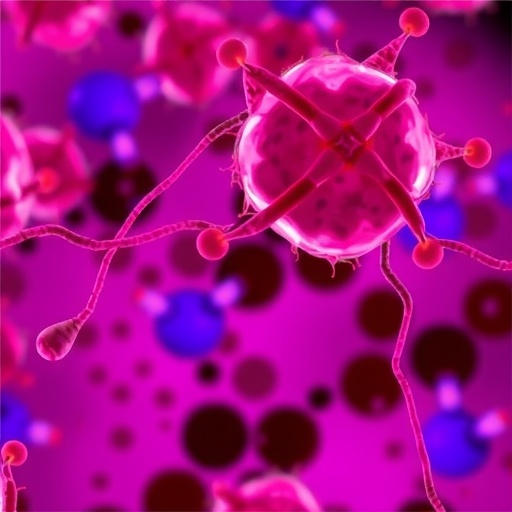In a groundbreaking study published in the Journal of Translational Medicine, researchers have unveiled a critical link between neutrophil extracellular traps (NETs) and the promotion of colorectal cancer liver metastasis through the regulation of lactate dehydrogenase A (LDHA) expression. This discovery opens new avenues for understanding the complex mechanisms that govern cancer metastasis, particularly in colorectal cancer, which is a leading cause of cancer-related mortality worldwide.
Neutrophils, a type of white blood cell, are essential components of the body’s immune response. They not only help combat infections but also play a significant role in the tumor microenvironment. The formation of NETs, which are webs of extracellular fibers composed of DNA and proteins, serves as a trap for pathogens but has also been implicated in various cancers. The intricate interplay between inflammation and cancer progression remains an area of intense investigation, with NETs emerging as a double-edged sword in tumor biology.
In the study led by Li et al., the researchers delve deep into the mechanisms by which NETs influence cellular behaviors that facilitate metastatic spread. They demonstrate that the presence of NETs in the tumor microenvironment can significantly upregulate LDHA, an enzyme that plays a pivotal role in anaerobic metabolism. LDHA is often overexpressed in many cancers, including colorectal cancer, wherein it contributes to the metabolic reprogramming that allows tumor cells to thrive in low-oxygen environments typical of solid tumors.
One of the most remarkable findings of the study is the direct correlation between NET formation and the increased expression of LDHA in colorectal cancer cells. The authors meticulously outline how the interaction between tumor cells and neutrophils can lead to enhanced metabolic activity of cancer cells, which in turn promotes their survival and proliferation in the hostile environment of the liver, a common site for metastasis from colorectal primary tumors.
The research highlights that targeting the interaction between NETs and cancer cells may present a novel therapeutic approach. By inhibiting NET formation or blocking the pathways related to LDHA upregulation, it may be possible to hinder colorectal cancer progression and metastasis, potentially improving patient outcomes. This dual approach of targeting both the immune response and the tumor metabolism could pave the way for innovative treatments, especially in advanced stages of cancer where traditional therapies have limited efficacy.
Furthermore, the study underscores the importance of the tumor microenvironment, which is not merely a passive background for tumor growth but an active participant in cancer progression. The exquisite balance of pro-tumorigenic and anti-tumorigenic activities in the tumor microenvironment orchestrates the fate of cancer cells. By manipulating this balance, it may be possible to enhance therapeutic responses and reduce metastasis.
The implications of this research extend beyond colorectal cancer. Understanding the role of NETs in cancer biology provides valuable insights that could be applicable to other types of cancer characterized by a high incidence of metastasis. The findings encourage further investigation into how different cell types within the immune system can interact with tumors and potentially drive metastatic processes.
In conclusion, the research conducted by Li and colleagues sheds light on the intricate relationship between neutrophil extracellular traps and colorectal cancer liver metastasis. By elucidating the pathways through which NETs regulate LDHA expression, the study offers new hope for developing targeted therapies aimed at improving patient survival rates. The dynamic interplay between immune cells and tumor cells represents a frontier in cancer research that warrants further exploration.
As scientists continue to uncover the complexities of the immune system’s involvement in cancer, it is essential to remain vigilant about the potential adverse effects of targeted therapies. The fine line between harnessing the immune response for tumor elimination and inadvertently promoting tumor growth is a delicate one. Thus, understanding the full spectrum of immune dynamics will be crucial as researchers work toward the next generation of cancer treatments.
Moving forward, it will be essential for the scientific community to collaborate and expand upon these findings. With ongoing research, there lies the potential to develop biotherapies tailored to manipulate the tumor microenvironment effectively. As we work towards a future with improved cancer management strategies, integrating knowledge about the immune system and tumor metabolism will be key to making significant strides against metastasis.
In summary, this research not only highlights the essential role of neutrophils and NETs in the progression of colorectal cancer but also sets the stage for innovative treatment strategies that could revolutionize the way we approach cancer therapy. As our understanding deepens, we inch closer to unlocking new methods of combating one of the most formidable health challenges of our time.
Subject of Research: Neutrophil extracellular traps and colorectal cancer liver metastasis.
Article Title: Neutrophil extracellular traps regulate LDHA expression to promote colorectal cancer liver metastasis.
Article References:
Li, N., Yang, S., Hu, C. et al. Neutrophil extracellular traps regulate LDHA expression to promote colorectal cancer liver metastasis.
J Transl Med 23, 1208 (2025). https://doi.org/10.1186/s12967-025-07174-y
Image Credits: AI Generated
DOI: https://doi.org/10.1186/s12967-025-07174-y
Keywords: Neutrophil extracellular traps, colorectal cancer, liver metastasis, LDHA, tumor microenvironment, immune response, cancer therapy.
Tags: anaerobic metabolism in cancer cellscancer-related mortality causescolorectal cancer liver metastasiscolorectal cancer researchimmune response in cancerinflammation and cancer progressionlactate dehydrogenase A regulationmechanisms of cancer metastasisNETs in tumor biologyneutrophil extracellular traps and cancerneutrophils in tumor dynamicstumor microenvironment interactions





